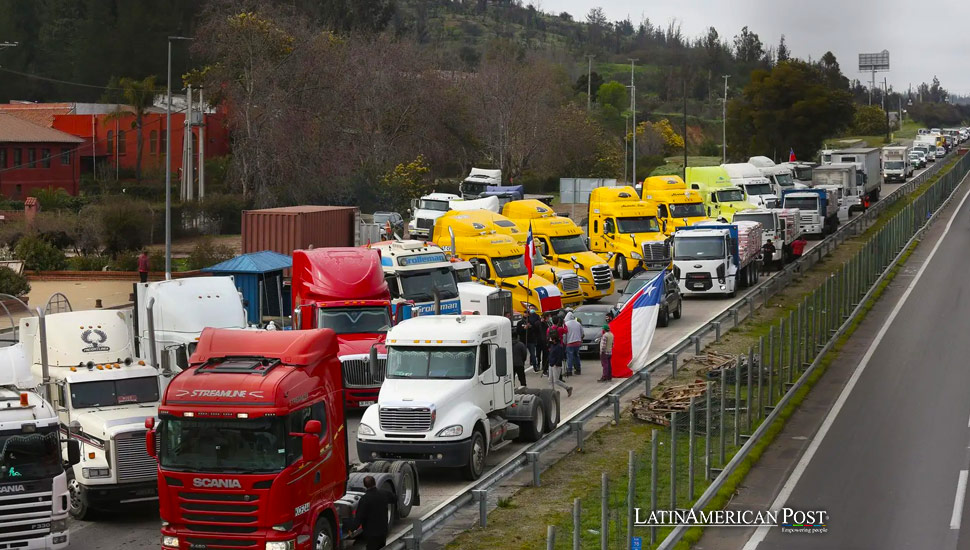Security Concerns Halt Chilean Truckers, Impacting National Business

In northern Chile, truckers have launched an indefinite strike due to rising security concerns, demanding government action to address what they claim is migrant-linked crime disrupting their operations.
In the pre-dawn hours of Monday, the highways of northern Chile began to empty as local truckers initiated an indefinite strike. This drastic action, aimed at protesting the “increase in insecurity” in the region, highlights a growing issue that has significant implications for the trucking industry and the broader business environment in Latin America.
The truckers’ strike was sparked by what they perceived as an intolerable increase in criminal activities affecting their operations. According to Cristián Sandoval, president of the Confederación Fuerza del Norte de camioneros, the truckers are demanding an immediate crackdown on crime and specific governmental measures, such as the deportation of foreign nationals with criminal records and the declaration of a constitutional state of emergency to allow military deployment in response to public disorder.
Historical Context of Security and Business in Latin America
The relationship between security and business in Latin America has been complex and challenging. Historically, the region has grappled with various forms of violence and crime, ranging from guerrilla warfare in the 20th century to drug cartels and organized crime syndicates that have risen in prominence over the past few decades. These issues have directly impacted economic activities, with businesses frequently finding themselves at the mercy of extortion, theft, and other forms of crime.
In Chile, which has long been considered one of South America’s most stable and prosperous countries, the recent rise in crime linked to organized criminal groups, some of which are involved in drug trafficking and other illegal activities, has begun to shake this image. The presence of organized crime has not only threatened the safety of citizens. Still, it has also imposed substantial costs on businesses, particularly those dependent on the smooth flow of goods and services like the trucking industry.
Economic Impact of the Strike
The strike by northern Chilean truckers is more than a local issue; it threatens to disrupt supply chains nationwide. The north of Chile, rich in minerals and a hub for the country’s export-oriented mining industry, relies heavily on trucking to transport goods. A prolonged strike could lead to delays in shipments, increased transportation costs, and, ultimately, higher domestic and global prices for consumers.
Moreover, the strike could deter foreign investment. Investors often consider a region’s stability and security critical factors in decision-making processes. The perception of increasing insecurity and the government’s inability to manage the situation effectively might make Chile less attractive to foreign businesses and investors.
Government Response and Public Opinion
All sectors of Chilean society are closely watching the government. Some sympathize with the truckers’ security concerns, while others are wary of attributing the rise in crime solely to migrants, fearing that such claims could stoke xenophobic sentiments.
Given the region’s history with military rule, the request for military intervention in civilian areas is particularly contentious. Some see such measures as a slippery slope back to the days when military dictatorships overrode democratic governance in much of Latin America.
Looking Ahead: Solutions and Challenges
As the strike continues, finding a solution that addresses the truckers’ security concerns while ensuring the rights and protections of migrants and maintaining civil liberties will be a delicate balance. Truckers’ demands for tightened border controls and improved security measures are echoed in many parts of the world, facing similar challenges.
The issue extends beyond the trucking industry or the immediate economic impacts. It touches on more prominent governance themes, migration, human rights, and regional stability. How Chile addresses these challenges will likely set precedents for how similar issues are approached in other Latin American countries facing the dual challenges of ensuring security and fostering economic growth.
Also read: Chile-Spain Aerospace Alliance Bolsters Latin American Defense
The indefinite strike by Chilean truckers signals that security issues increasingly influence business operations and economic stability in Latin America. The situation unfolding in northern Chile is a microcosm of broader regional challenges. It underscores the need for comprehensive security strategies that safeguard businesses and economies while upholding democratic values and human rights. As governments across the region struggle to balance these needs, the world watches to see how one of South America’s most stable economies handles this growing crisis.





